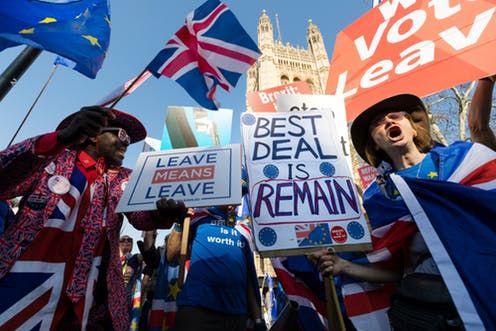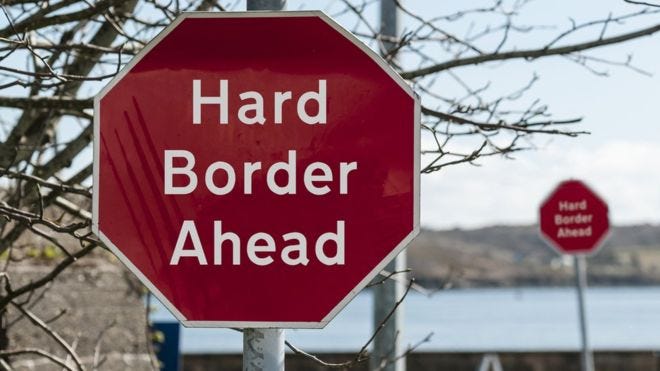Brexit: The Echo Chamber Meets British Foreign Policy


Forty years ago, Humphrey Appleby astutely explained the British Foreign Office’s strategy hasn’t changed for over five hundred years. We wanted to ensure the Single Market failed, we went into the EU to ruin it, and our interests are best served by a dis-united Europe. And the latest iteration of that idea is Brexit, which again, has been brutally effective in reducing Europe into chaos.
This is not an injury against the Establishment. This is a perfect fulfilment of that Establishment’s ongoing strategy of foreign policy.
The Russians know it. Take it from the head of the FSB, Nikolai Patrushev:
“Our file on British intelligence services’ activities is huge. We know their strengths and weaknesses. Since the times of Queen Elizabeth I, British intelligence has operated on the principle that the end justifies the means.”
Our goal is not unity. We are not all one, with common interests. We are not one single homogenous people all desiring peace. British philosophy has always been quite simple: divide and rule. Idealistic commune thinking dies when it meets the reality of power dynamics. Where we meet Russia right up close is in our mutual desire to see our neighbours divided, lost, and in disharmony.
The First World War erupted because countries were bound together with treaties, and nobody saw it coming; the Second World War emerged because imperialism took over the largest economy, and it was an unthinkable repeat. The Bosnian genocide — which the EU abjectly failed so dismally to control — was provoked by ethnic hatred of peoples forced to live as neighbours. Bonding states, such as the US, only works for new countries; not those with thousands of years’ history behind them.
Binding agreements, imperialism, enforced co-residency, and total incompetence: responsible for a century of war, hundreds of millions of deaths, and here we are again.
Our goal with the Europeans has always been to keep them fighting and disagreeing, so we can step over them and control the whole show. For example, keeping France and Germany at odds stops them from overwhelming us together. Brexit is going to fuel that for a good ten years, while we establish new tariff-free links with China, Russia, India, and Australia, that other EU countries can’t.
In with the EEC, special treatment for Maastricht. Out with the Euro, in with the Single Market. In with the Lisbon Treaty, out with the ECHR and closer union. In with convincing the British people to stay, out without reform. Now out completely, until we’re in again a little with a Single Market agreement, before we’re out more while inflaming the Dutch, Danish, French, and Italian exits. You never have certainty on the British position — and while you’re trying to get your stability and balance, we’re pandering to be China’s best friend, and brokering the US’s imperialism.
As long as they’re in a mess, the UK is always the better option for trade and sanity. Their in-fighting makes us the choice for the US and Canada to “springboard” off as the “bridge” to that market. And when we’re no longer the dominant voice, it’s time for out — to restart the cycle. English is the official language of the EU — for no rational reason. Our next job is to make the UK far more pleasant and competitive to deal with: with our free trade economy offering no tariffs and less regulation, — and potentially access to the Single Market — why import from Europe with its protectionist customs’ unions and failing currency, when ours gives you far more freedom?
Whether you like it or not, democracy has been served in a fair vote. And you can tell just corrosive the effect of Brussels’ autocratic nature has sunk into the psyche, as the EU has always tended to react the same way when their paperwork has been rejected: hold another vote until they vote the way they’re supposed to. Now they want another referendum. Backbenchers want Parliament to block it.
A majority of the British people have democratically expressed their will, and yet again, smaller numbers want that overturned in their favour. One generation votes to restore accountable democracy, against the complacency of their children who are virtually indifferent to it.
Scotland will have a seriously uphill battle: Spain will almost certainly block their entry on account of not wanting to catalyse a Catalan independence vote, even if they try to use Gibraltar as leverage. England has refused to allow them to use the Pound, and they don’t have a central bank. The other countries will be falling over themselves to stabilise the relationship with the UK that they won’t risk screwing it up by enabling Scotland to secede. An independent Scotland with the Euro is going to be severely punished by England, and it’s a risk too far. You go with the one you trade with.
The British Prime Minister and his merry little band bet on the laziness and comfort of the status quo. In short, they shorted the population and bet against the British people. And if there’s one thing the British like to do, it’s take their politicians out for a walk. He’s lost his job, the Chancellor is about to lose his, next up will be the Opposition leader, and if the public have their way, they’ll burn the rest of them, and complain about the lack of politicians left.
A small but immediate example is how Chancellor George Osborne is now on the menu. From Murdoch’s shit-rag, The Sun:
Focusing on his hyped up anti-Leave “Emergency Budget”, one MP said it would be “the last document he draws up in Treasury”.
A Brexit backing minister said it was “whisky and revolver time” while another Tory MP declared the Chancellor was “toast”.
Whisky and revolver time. There aren’t many governments where you’re going to hear that kind of venom, with the same mixer of gallows humour.
You can say a lot about us Brits, but we’re a damned cruel bunch when we want to be. The British press are infamous for their viciousness; the City is absolutely derided for its corruption; the Empire starved India, torched the White House, and sacked Nassau; any financial success is received with shame and cynicism; the House of Commons is so wild visiting leaders can’t speak to it; and when it comes to politicians, there’s nothing we fetishize more than crucifying them publicly.
We might be the long-suffering, live-and-let-live, quiet-desperation lot, but there is a point when you poke the British Lion a few too many times before it roars from toothache. It’s worth remembering we have a habit of killing our monarchs, and revel in being able to legally require them to sign their own (literal) death warrant.
Weeks before the Referendum, English footballs fans were involved in riots with their Russian equivalents in Marseille which allegedly turned it into a war zone. Amongst their endless chants — other than “Sit down if you hate the French” was the foreshadowing insult: “Fuck off Europe, we’re all voting out”. At the Basildon polls, it was almost impossible to announce the result because of the volume of people chanting “Fuck off Brussels”. On his first official visit afterwards, the Prime Minister had “traitor” shouted at him.
Our millennials are really, really upset about their future being “stolen”, “lost” or “stripped” from them. Only one problem. Their democratic majority didn’t show up to claim it.
Two-thirds of millennials couldn’t be bothered to vote. According to several analyses (Sky, Ashcroft exit polling etc), the under-25 turnout was 31–36%. According to the Guardian, almost a quarter of Glastonbury revellers didn’t. The implication is that the 80% of them voting to stay have always expected they should have their own way, because they are and know everything — and everyone else is so antiquated and backward. 16M people — the statistical majority of registered voters — disagree and don’t think the same at all. What a shock to the self-important and self-righteous.
And herein lies the rub: there’s a much bigger question that a whole generation needs to ask itself: how exactly have they been so shocked at what the majority of their fellow countrymen feel, and so easily lost their own history?
How on earth did you miss it?
2011 saw rioting in the streets. UKIP won 13% of the vote at the last election. The BNP was the largest of all political parties, with over 1M members. Parliament voted to stay out of Syrian affairs. An MP was murdered by a white right-wing extremist. Greece has fallen to pieces and been euro-blackmailed by the EU, while youth unemployment is at an all-time-high on the continent. This has been boiling for over ten years, and the referendum was the cork spilling out of the bottleneck.
It’s really not that extraordinary when 14M people — 80% of those under thirty — want to live under a supra-government they can’t identity or vote out, because the statistics suggest they‘re not that concerned about voting anyway. The reaction, naturally, is to reject the outcome of the democratic process, which is ironic in the extreme when you consider their opposition was voting to be ruled by its own democracy.
It gives you the distinct impression that a whole generation of Baby Boomers were collectively lecturing their children: “we’re doing this for your own good.” The next EU dictator is really going to be something, because they’ve already created his/her empire for them — military action won’t be necessary to claim land when you rule 508M people, aren’t accountable to anyone, and can’t be voted out.
But perhaps the most stunning realisation from the whole torrid affair is the writhing and raging of an entire generation who get their take on the world from Facebook. Ask any Brit, and they’ll tell you of the spleen being vented online in social media — the explosive vitriol, the shock and disbelief.
“Everyone was for it on my Facebook. I don’t understand what happened.”
There it is. Everyone in my echo chamber thinks the same as me. I can’t believe the world thinks differently. Yes, groupthink. The old cancer, which has exploded out of control in the ++ungood era of social media.
Eli Pariser gave a frank — and honestly, highly alarming — TED talk which brings to light a very disturbing trend, which he labelled “filter bubbles”.
The gist is quite simple: “news” and “preference” algorithms used by social media are inherently there to promote confirmation bias. Did you click on that Republican NRA news article? You must like Republicans, and want more Republican articles. And less democratic-focused news. Why don’t you “mute” people you don’t agree with? Why not “downvote” someone who opposes your worldview or hypocrisy?
If you wanted to put it more bluntly, social media has turned people stupid. In an era when we have to put special markings on roads so kids staring at their phones don’t get run over, the technology is making us less informed because of the groupthink it has encouraged to flourish. We have all the information in the world “at our fingertips”, yet we can’t, don’t, or won’t use it to improve our analytical cognition. We choose exposure to 100 articles that confirm our view, instead of 25 that agree, and 25 that critique.
Being exposed to that which challenges our point of view is often far more relevant and valuable.
The end result is you get more and more of what you want, and less and less of what you need. What we need is all angles of an issue that promote debate and circumspectral analysis, and what we want is to hear those things that confirm our righteousness. When everyone is getting their own bias confirmed over and over, our views become less nuanced and more entrenched. The end result is our critical thinking faculties fall into disuse, and we all end up thinking the same — and believing everyone outside thinks the same.
When this happens on a generational scale, we get millions of people who are baffled as to why half their country doesn’t do what they’re expected to. And a very painful lesson that vocalising on social media means absolutely nothing in comparison to the ballot paper. Your Facebook means nothing, your echo chamber is injurious, and decisions are made by those who show up. Logging on to a website is not showing up.
This technological folly is prevalent on any Californian social media hub , particularly those who subscribe to the idea of “up-voting” and “down-voting”— Reddit and its vote-brigading, on top of Gawker and it’s comment-shaming, being prime examples. But by far the worst, is the young Quora. Political correctness and groupthink is so endemic on these sites that the “glorious dissent” is all but extinguished in favour of the “right” opinion that is allowed to stay.
Again, like it or not, but Brexit — whichever way you voted — was a Glorious Dissent. And that’s a defining British characteristic, along with ritually slaughtering our leaders, and profiteering from the discord of our neighbours: the stubbornness to be the only one who disagrees. When the British act en masse, even when divided, the result is earthquake-rendering.
Thirty years of identity politics have bred a generation of people who don’t know who they are, don’t particularly hold democracy as precious, don’t realise they are not in the majority, and can’t understand how the world works. Brexit was an unwelcome smack behind the ear that nobody wants, but will resound around the echo chamber so loudly that maybe, just maybe, it’ll jar a few out of that cosy sleepwalk with the other turkeys who are happy to vote for Christmas if the person next to them is.
